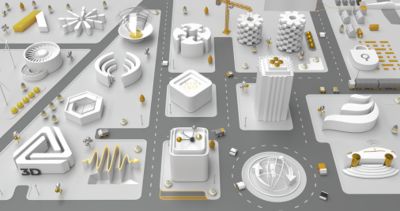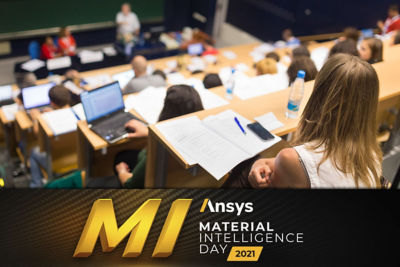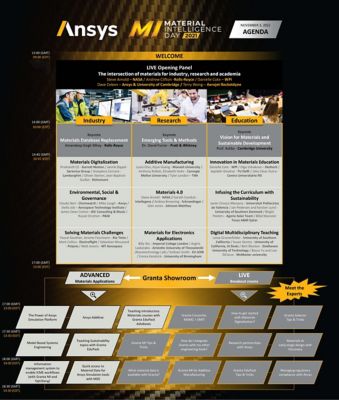-
Ansys is committed to setting today's students up for success, by providing free simulation engineering software to students.
-
Ansys is committed to setting today's students up for success, by providing free simulation engineering software to students.
-
Ansys is committed to setting today's students up for success, by providing free simulation engineering software to students.
-
Contact Us -
Careers -
Students and Academic -
For United States and Canada
+1 844.462.6797
Make Material Intelligence Count
Our new virtual event – Ansys Material Intelligence Day will showcase best practice from across industry, research and academia.
Confirmed Speakers: NASA, Rolls-Royce, Lamborghini, University of Cambridge, Garrett Motion, Carnegie Mellon University…
- Join thought-leaders in a LIVE panel to discuss the future of materials
- How did they do it? Customers talk best practice on building material intelligence using Ansys Granta tools
- Innovation on-demand with insight into the areas of Materials Research and Academia
- LIVE demos, tips, tricks and more from our material experts
LIVE Panel
9 Tracks
40+ Speakers
LIVE Demos & Advice
One Day. Nine Tracks. Unlimited Possibility.
This event is for those in industry, research or academia already using Ansys Granta products or wanting to use accurate and traceable materials information as an input to their simulation or design.
Register free-of-charge for our 1 day event on November 3rd.
INDUSTRY
Making the case for digital transformation in an engineering company can start with materials. Companies from many different industries have made the leap into digitalizing their materials information. Further connecting it into the wider set of engineering tools – such as simulation, CAD and PLM – has proven to bring substantial commercial benefit and efficiency.
Environmental, social and regulatory pressures are mounting on manufacturers. More emphasis is being put on the materials they are making their products from, at all stages of the design process. Using material data is becoming key to making the right choices for long-term product sustainability as well as adherence to complex local and international regulation. Engineers are looking to use this materials information as early as possible in the design process.
Material challenges arise at any stage the product life cycle. From making material and engineering property trade-offs at the concept stage to finding alternative materials due to supply chain shocks. Examples of working around these challenges to develop lighter, less costly, or more robust products exist across almost every industry – many coming from similar issues.
RESEARCH
Manufacturing methods are evolving with Additive Manufacturing, removing design constraints and achieving near net-zero waste. Achieving this right-first-time opportunity requires understanding the material and how its properties and potential defects build-up during the process. Process parameter optimisation and reproducibility are core goals which require a multi-scale understanding. Research is at the forefront of progressing the use of materials data in Additive for the next generation of products.
Looking to the future for materials, Materials 4.0 fuses topics such as materials digitization, machine learning, multi-scale materials modelling, process modelling, distributed computation, with materials information management and the goal of creating reproducible workflows that can be extended beyond a handful of experts to users across the enterprise (ICME). Ansys have partnerships and research projects touching many of these different topics.
Electrification is an underlying technology theme for many industries and understanding how materials can be used for electronics applications is becoming a key area of research. From circuits to macro-level joints for PEMD and EV application, electrical conducting materials challenge our limits of multi-scale interactions from electrons to system performance. Manufacturing and joining of electrical materials, or layers, adds another complexity requiring extensive empirical data collection and smart analysis techniques.
EDUCATION
Materials Education has been constantly evolving over the years to train the next generation of engineers, scientists and designers to meet the demands of research and industry. Educators have been creating, implementing, and recommending innovative ways to teach engineering concepts in the form of lectures, experiments, project-based teaching, and gamification, amongst others. These novel ideas and experiences are meant to inspire the materials community globally.
Built around 17 Sustainable Development Goals (SGDs), the 2015 United Nation’s agenda marked a historic moment for international collaboration, when 193 member states agreed on a strategic plan for the health of our planet. Offering a wide scope of inspiration, academics around the world have been enriching curricula, to encourage students to think critically when making choices for materials, manufacturing processes and/or during product design.
The COVID-19 pandemic has urged most educators across the world to move their teaching completely or partially online. With the lack of equipment and resources to perform in person experiments, educators have had to lean on digital tools and apps to convey similar learning outcomes. This is where we have seen how modelling and simulation tools are becoming increasingly important for students to learn engineering concepts and address real-life applications while saving time and minimizing cost.
INNOVATE, REDUCE COST & RISK, SAVE TIME, COLLABORATE, EDUCATE, COMPETE
USING THE RIGHT MATERIALS
CONFIRMED AGENDA
Find out what time your favorite talks are happening, this doc will help you plan your day.















